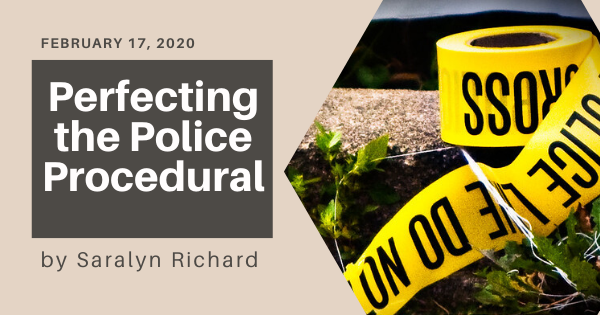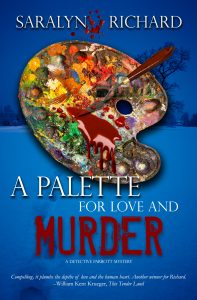by Saralyn Richard, @SaralynRichard
The heart of any mystery novel is a good story. But when writing a police procedural, having a good story is not enough.
A police procedural is a form of detective fiction in which a crime is solved by members of the criminal justice system, including police, forensic specialists, and medical examiners. The team of problem-solvers works together to gather and evaluate clues, collect evidence, form hypotheses, and use these things to bring criminals to justice.
When my first mystery novel was named a finalist for best police procedural, one of my friends remarked, “Wow, and that’s the hardest genre to write!” I laughed at her comment, but as I thought about it later, I realized there is a bit of truth to it.
What makes police procedurals complicated is the need to be authentic and accurate. Doing so requires familiarity with the latest methods of forensic science for the time period of the novel. For example, a contemporary story in which the dominant investigative method is fingerprinting and footsteps, would draw criticism from readers who expect DNA and trajectories and sophisticated toxicology.
Equally important is the need to know specific protocols used in the setting’s locale. Procedures for serving notice, interviewing witnesses and suspects, bagging evidence, and sharing information with other investigative entities is often specific to the state or country of the crime’s jurisdiction. As an example, in Brandywine Valley, where my Detective Parrott Mystery series takes place, wills are probated through the Supreme Court of Pennsylvania’s Standardized Register of Wills and Orphans’ Court. Since I don’t live in Pennsylvania, I would never have known this fact without research.
Speaking of research, I have had wonderful experiences visiting with people who have expertise in solving crimes, whether I know them personally or not. As public servants, police officers are usually friendly and welcoming when I’ve imposed on their time to answer questions for fictional crimes. Most of the time I rely on a local police lieutenant, who is generous with his responses to my questions. Sometimes, though, I call upon the police departments in other cities. When I introduce myself as an author of detective fiction, I always receive a warm response. I believe it’s because the professional crime fighters appreciate my desire to portray them accurately.

Last summer I attended the Killer Nashville writers’ conference, a gathering of mystery and thriller writers from all over the world. One of the activities at the conference was a mock crime scene, set up by Dan Royse, former Tennessee FBI Assistant Director. For 48 hours, conference attendees were invited to visit the hotel suite, where a dead mannequin was sprawled on the carpet. Abundant items were scattered about, replicating an actual case from the past. Our job, should we choose to accept it, was to determine which items were pertinent to the murder and should be collected as evidence, which forensic tests we would want labs to perform on the collected items, and what our hypothesis was of who had killed the victim.
The challenge of the mock crime scene activity was more than delightful entertainment. It provided a hands-on education in the rigors of investigation. I learned how easy it would be to overlook certain clues or to mess up others. I learned a lot about DNA, including how expensive it is to run DNA tests and how crowded the queue is for getting them done timely. As Royse said, “DNA could be anywhere, but you can’t just test every surface of every object in the room. You have to be strategic about what you want tested.”
Fortunately, I love doing research when I’m writing. I love learning about new communities, occupations, procedures, and science. I enjoy immersing myself in the milieu of Detective Parrott, seeing what he sees and doing what he does. Thanks to the many people with whom I’ve consulted, I find joy in writing police procedurals. Likewise, I hope my readers enjoy reading them.

Mystery and children’s book author, Saralyn Richard, won the Killer Nashville Silver Falchion Readers’ Choice Award 2019 for her first novel, MURDER IN THE ONE PERCENT. The book was also a Finalist for the Killer Nashville Silver Falchion Award for Best Procedural Novel 2019, and garnered other honors and kudos. A PALETTE FOR LOVE AND MURDER, out in February 2020, is the second title in the Detective Oliver Parrott series. Richard’s children’s picture book, NAUGHTY NANA, has reached thousands of children in five countries. A member of International Thriller Writers and Mystery Writers of America, she has lived in New Orleans, St. Louis, and Chicago, and now lives in Galveston, Texas. Richard loves to connect with readers through book clubs, organization meetings, or on social media at the following links:
Twitter | Facebook | LinkedIn | Pinterest | Web
Writer @SaralynRichard on her research to perfect her police procedural: Share on XPhoto credit: Tony Webster on Visual hunt / CC BY


Thanks for posting today, Saralyn! The research involved in the police procedural is definitely more than needed when writing cozies. I’ll have to make it over to Killer Nashville sometime…looks so interesting!
Many thanks for welcoming me to post on your awesome blog, Elizabeth. Surprisingly, my mysteries have also been labeled as cozies. I think it’s because I steer clear of violence, and I hate the sight of blood, even on paper. I do love mysteries of all kinds, though, and I’ll be looking for you at Killer Nashville!
There are so many details you’d need to get right, especially in this day and age.
I like the idea of the mock murder and identifying clues. Proved if you really knew your stuff or not.
I thought that sounded like a great idea…and fun, too. :)
Thanks or your comment, Diane. And, yes, the mock murder investigation was an intriguing and valuable activity!
I couldn’t agree more about the need for careful research and authenticity in police procedural. That effort means a more believable story, which draws readers in. O know when I was writing my most recent book (which a lot of people would likely call a police procedural), those details (and the research, etc.) took up quite a bit of my time. But it was worth the effort.
I can only imagine the time it took! It’s definitely worth it. :)
Definitely worth the effort and also enjoyable. The knowledge and relationships that come from this research are among the best benefits of writing. I’m checking out your book, Margot.
Hi Elizabeth – what an interesting guest … I suspect if I started writing crime (unlikely Saralyn … so you’re safe!) I’d be over the pond to try and find you … and get you to answer questions before I wandered off to find a real policeman. Though I’d be quite interested … while the mock murder set up would be interesting to see, and then find out what was relevant etc … Cheers and good luck to you both with your books – and to Margot with hers. All the best – Hilary
Hi, Hilary. Thanks for your comments. If you do follow the inclination to cross the pond, even virtually, I’m happy to chat with you about any facet of the writer’s journey.